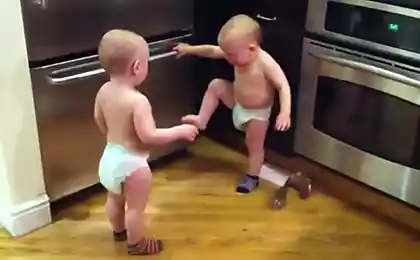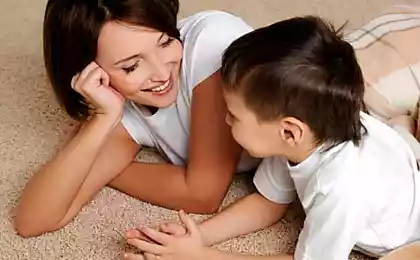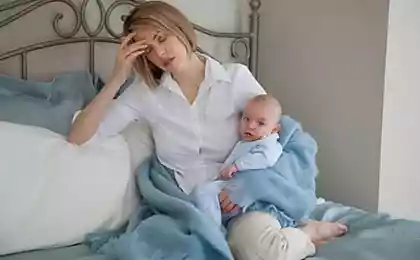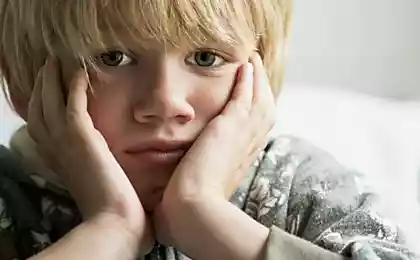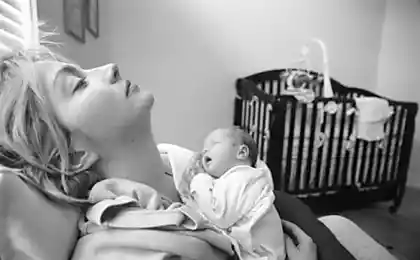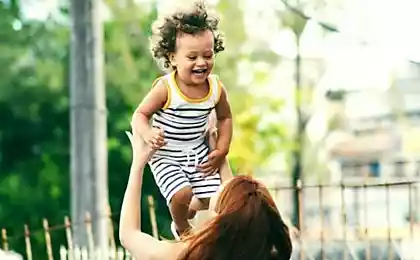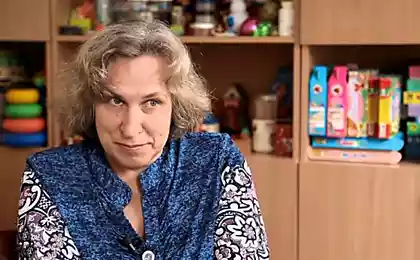855
Why babies SHOULD NOT sleep alone
"The question should not be "is it safe for baby to sleep with adults.." the Question should be put differently: is it safe for baby to sleep without an adult". © James McKenna
With the question of where the baby sleep, it's not as easy as I would like. In modern Western society on this topic continue to argue doctors and researchers continue to sound and the recommendation against a joint dream.
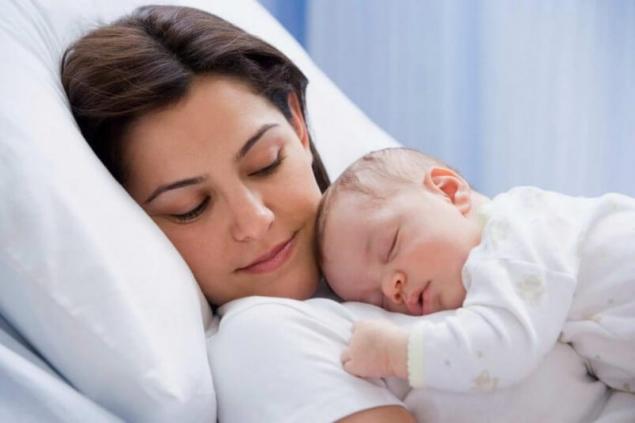
The term “co-sleeping” means any situation in which a parent (usually the mother) is close enough to the baby so both could immediately respond to the “touch” signal from another. Sleep in the same room – is also a form of co sleeping, it always is considered safe and protective. But that's not the most common room, the thing is what happens between parent and baby. Often scientists forget to take this into account.
Unfortunately, professionals often confuse between the terms, and never clear that they mean a joint dream in each situation – sleeping in the same room, one bed, more dangerous sleeping together on the couch... And you need to share.
It is wrong to say, for example, that “co-sleeping is dangerous”, when talking about what the baby sleeps in the same room with their parents. Some studies show that the risk of death among infants in such a situation is reduced by half!
Another form of sleep in a common bed, such a form can be implemented safely, and can be dangerous, but categorical estimates can not be.
What is really dangerous is sleeping together on the couch or sofa, because infants are often clamped or pressed against the back of the couch or pressed against the couch cushions face, there is a great risk of suffocation. You should always consider the risk factors. To say that co-sleeping is dangerous, it is still something to consider, that children should not be transported in the car.
One of the main reasons why babies regularly sleep in the parents bed, and why simple cautions against this will never work, is that co-sleeping is biologically rational, what not to say about the laying of the baby in the other room, especially when breastfeeding.
If properly co-sleep, he saves children's lives and improve the health and well-being of both child and mother. Again, even just the presence of an attentive adult in the room by half reduces the risks associated with sudden infant death syndrome during sleep (SIDS) or death due to negligence!
Research:
In Japan co-sleeping and breastfeeding is accepted in culture as the norm, and the statistics on SIDS and the lowest in the world. Breastfeeding in a joint sleep in parent's bed, the baby gets twice the feedings and significantly simplifies the process, which in turn allows her and the child more and sleep better. And more frequent access to maternal milk and, therefore, antibodies from the milk, reduces the overall morbidity of infants.
Because night feeding directly into the bed more convenient and easier for mothers, this practice also increases the duration of breastfeeding. That, according to research by Dr. Helen ball of Durham University, reduces the risks of breast cancer in women. To advise women never to sleep with your child – all the same what to advise people in General not to eat fats and carbohydrates because in the excess they lead to obesity and death from heart attack, diabetes and cancer.
As for the co sleep in the parental bed, you need to know that statistically the countries with the highest percentage of families taking children sleeping in his own bed, the lowest percentage of infant mortality, including syndrome vnezapnoj death in my sleep. It is important to understand the conditions in which sleep a total bed gives more security, and in any stanovista risk factor. It seems that all the factors are crucial: who sleeps with the child, in what conditions, how to organize space, what is the relationship between the parents.
How to understand recommendations:
Recently, the American Academy of Pediatrics (the American Academy of Pediatrics) (AAP), in which I acted as expert adviser to the Committee for the study of the sudden infant deaths (SIDS), issued the recommendation that babies sleep better next to his mother in the same room but in separate beds. And although I am glad this historic moment, I was concerned about the implications of the recommendation, which is as it should under any circumstances take your child to his bed – and it's not fair, and maybe immoral in relation to mothers. This message seems to say: “whatever you do, your sleeping body is a lethal danger to the child, the danger which you or he can't control”. If that were the case, we people here would have never happened, no one would argue about the risks. We survived only because the mother of our ancestors slept with their babies and fed them at night!
And I'm not one think so. The idea of sleep is supported by such respected organizations as the Academy of breastfeeding medicine, the Committee on breastfeeding USA, a division of on breastfeeding American Academy of Pediatrics, the international La Leche League, UNICEF and WHO, all of them rely on modern scientific evidence that helps mothers and babies to be healthy and provides them with security.
But we also share a common view on what factors threaten the security of sleeping in a common bed and increase the risk of strangulation from either parent, or from the fact that unsafe space itself. For example, the baby dangerous to be in bed with the drunk adults, or adults who take drugs, protoplasm his attention and sensory memory, with an adult who is overly tired. Also in bed with the baby not allowed in younger children. In addition, babies of women who smoke during pregnancy have poorer tone: they can't successfully and respond quickly when they have difficulty breathing, so Smoking mothers should put their babies near, but in a separate bed.
My own research suggests that infants are breastfed (and their mothers) develop high spatial sensitivity relative to each other in a dream, and it protects baby from the risk of being crushed. But babies who bottle-fed, should sleep in a separate bed.
To sleep on your stomach, especially on a soft mattress is a special risk factor for babies, it is also dangerous to cover their heads with a blanket and lay them on a pillow or near the pillow. It is best to slightly tuck in and plugging any cracks or gaps between the bed and the wall, because the baby may fall or get stuck and suffocate quickly. In my opinion, it is best to move the bed in the center of the room, so there are no cracks at all.
Our biological imperatives:
When I write that I support co-sleeping in parent's bed (subject to security considerations), I rely on the knowledge gained during the work on the study of how there is this shared dream, what this practice means for moms and babies and how it biologically works.
Due to the fact that breast milk is low in carbohydrates (nature is so ordered, because the digestive organs of the infant is not yet ready for another power), nature also provides for night feeding. Hence, the tendency to spread the practice of a joint dream. 73% of new mothers leave the hospital starting to breastfeed, and even among those who never intended to take the child to his bed, many soon discover how it is easier and how much more satisfaction and peace of mind brings the practice of a baby sleeping close by.
But the joint dream is necessary not only for the convenience of night feedings. Babies also have something to say, from the very beginning. And so it turns out that they are not impressive the cries about how it's dangerous to sleep next to mom. On the contrary, invincible ancient, rooted in neuroscience reaction to the smell of maternal milk, its touch and feel of the movement can fully extinguish the impulse of crying, helping the baby to establish breathing, body temperature, absorption of calories, hormones, the immune system, improve oxygen uptake. Sleeping together (even in separate beds, but next to each other) provides a positive clinical changes including increased duration of sleep, and like, make babies... well, happier.
Let us remember that although the technology and culture we in the industrialized West are developing at a frantic pace, our children are still born by neurologically underdeveloped among all the children of primates. At the time of birth, human babies are quite developed, only 25% of neurons in the brain. This is the uniqueness of people, and this feature could evolve biologically only under constant and uninterrupted /continuous contact with the mother: her body is the only environment to which the infant is truly adapted. Even modern technology alternatives have not yet developed.
In the absence of mother near no action of the infant is not meaningful as it does not make sense helplessness when mom not around. Biologically, it all makes sense only in the light of interaction with her body, this biological reality seems to ignore those who are opposed to the babies though, under any circumstances, slept in mom's bed that is customary in such situations to call a joint sleep. But this seems to explain why even those parents who put baby in own cot or cradle, still from time to time feel the need to take the baby with her – these observations we were able to scientifically confirm the work carried out in our laboratory, a joint dream at Notre Dame. If babies have a choice, they always seem to prefer the contact with the body of the mother alone.
Without a doubt, sleep in a shared bed can be dangerous and in this case it should be avoided. But neither the tragic case of fatal suffocation in the bed with parents does not prove anything about the practice, as well as more than three hundred thousand cases of deaths of babies in separate cots says nothing in General about the fatal dangers of Cribs and that they should be avoided at all costs. Do the same as well as possible to protect the infant sleep in a crib, it is possible to enlighten parents on how to make a safe co-sleeping in a shared bed.
From condemnation to understanding:
We still don't know what causes sudden infant death syndrome. But fortunately, the factors that increase the risk of SIDS is already widely known. Among them, the placing of the baby before going to sleep on your stomach face down, using soft mattresses, maternal Smoking, excessive wrapping and obstacles to the movement of air from a person. In sum, co-sleep, these risks are greater for weaker babies (e.g., risk of suffocation if the blanket, say, an adult will fall on the face and begin to interfere with breathing.
But the death of a baby in these circumstances by itself does not automatically mean that the reason I sleep in parent's bed or, even worse, that the child died from suffocation. Syndrome vnezapnoj infant death is observed as children in parents ' beds, and children in cradles.
Shameful and forbidden that the main pathology of the state (as in Indiana, for example) recommend to the rest of the pathologists to conclude that the cause of death in his crib is probably a syndrome, and in the parents ' bed – strangulation. Prematurely drawing conclusions about the suffocation (vs any other natural causes), until a thorough analysis of the facts, and toxicology, just based on the fact that the joint dream, these instances not only swindles scientific claims, but victimizing poor parents for the third time. The first time the stigmata of guilt falls on the parents at the time of death of their child, the second time it happens when professionals and doctors give press interviews, and very often a hint that when a baby dies in bed with an adult, there must be a reason in choking (or SIDS due to the shared dream). And the third time the parents drops the charges, when the police and medics do not yet have any evidence, say that apparently the child's death could have been prevented, and that their baby would be alive if it slept separately. This conclusion is not based on facts, but just for the unjust stereotypes about joint dream.
Neither the pathologist or researcher syndrome SIDS should not draw conclusions about choking before receiving extensive Toxicological findings and studying the scene, analyzing the information received from the mother and her considerations about the possible causes.
Risks of infant mortality – in the cradle, in the parent's bed, in any case, the increase in lack of access to information about security measures or when the society considers irresponsible, if parents choose the practice of a joint dream “at your own risk”, or the information in public sources overly simplified and comes to posters and leaflets in the stubby form of the message “just don't ever do that”. These recommendations distort the meaning of the true function and biological importance of such preferences distort the understanding of risks and how they can be cut and make this a safe practice, and these recommendations devalue themselves the reasons why people choose this practice in the first place. published
Authors: James McKenna (James J. McKenna Ph. D) and Edmund Joyce (Edmund P. Joyce C. S. C)
P. S. And remember, only by changing their consumption — together we change the world! ©
Join us in Facebook , Vkontakte, Odnoklassniki
Source: ecoways.ru/ru/recepti/beremennost_rodi_estestvennoe_roditelstvo/Biologichesky_imperativ_pochemy_mladentsy_ne_dolzhny_spat_odni.html
With the question of where the baby sleep, it's not as easy as I would like. In modern Western society on this topic continue to argue doctors and researchers continue to sound and the recommendation against a joint dream.

The term “co-sleeping” means any situation in which a parent (usually the mother) is close enough to the baby so both could immediately respond to the “touch” signal from another. Sleep in the same room – is also a form of co sleeping, it always is considered safe and protective. But that's not the most common room, the thing is what happens between parent and baby. Often scientists forget to take this into account.
Unfortunately, professionals often confuse between the terms, and never clear that they mean a joint dream in each situation – sleeping in the same room, one bed, more dangerous sleeping together on the couch... And you need to share.
It is wrong to say, for example, that “co-sleeping is dangerous”, when talking about what the baby sleeps in the same room with their parents. Some studies show that the risk of death among infants in such a situation is reduced by half!
Another form of sleep in a common bed, such a form can be implemented safely, and can be dangerous, but categorical estimates can not be.
What is really dangerous is sleeping together on the couch or sofa, because infants are often clamped or pressed against the back of the couch or pressed against the couch cushions face, there is a great risk of suffocation. You should always consider the risk factors. To say that co-sleeping is dangerous, it is still something to consider, that children should not be transported in the car.
One of the main reasons why babies regularly sleep in the parents bed, and why simple cautions against this will never work, is that co-sleeping is biologically rational, what not to say about the laying of the baby in the other room, especially when breastfeeding.
If properly co-sleep, he saves children's lives and improve the health and well-being of both child and mother. Again, even just the presence of an attentive adult in the room by half reduces the risks associated with sudden infant death syndrome during sleep (SIDS) or death due to negligence!
Research:
In Japan co-sleeping and breastfeeding is accepted in culture as the norm, and the statistics on SIDS and the lowest in the world. Breastfeeding in a joint sleep in parent's bed, the baby gets twice the feedings and significantly simplifies the process, which in turn allows her and the child more and sleep better. And more frequent access to maternal milk and, therefore, antibodies from the milk, reduces the overall morbidity of infants.
Because night feeding directly into the bed more convenient and easier for mothers, this practice also increases the duration of breastfeeding. That, according to research by Dr. Helen ball of Durham University, reduces the risks of breast cancer in women. To advise women never to sleep with your child – all the same what to advise people in General not to eat fats and carbohydrates because in the excess they lead to obesity and death from heart attack, diabetes and cancer.
As for the co sleep in the parental bed, you need to know that statistically the countries with the highest percentage of families taking children sleeping in his own bed, the lowest percentage of infant mortality, including syndrome vnezapnoj death in my sleep. It is important to understand the conditions in which sleep a total bed gives more security, and in any stanovista risk factor. It seems that all the factors are crucial: who sleeps with the child, in what conditions, how to organize space, what is the relationship between the parents.
How to understand recommendations:
Recently, the American Academy of Pediatrics (the American Academy of Pediatrics) (AAP), in which I acted as expert adviser to the Committee for the study of the sudden infant deaths (SIDS), issued the recommendation that babies sleep better next to his mother in the same room but in separate beds. And although I am glad this historic moment, I was concerned about the implications of the recommendation, which is as it should under any circumstances take your child to his bed – and it's not fair, and maybe immoral in relation to mothers. This message seems to say: “whatever you do, your sleeping body is a lethal danger to the child, the danger which you or he can't control”. If that were the case, we people here would have never happened, no one would argue about the risks. We survived only because the mother of our ancestors slept with their babies and fed them at night!
And I'm not one think so. The idea of sleep is supported by such respected organizations as the Academy of breastfeeding medicine, the Committee on breastfeeding USA, a division of on breastfeeding American Academy of Pediatrics, the international La Leche League, UNICEF and WHO, all of them rely on modern scientific evidence that helps mothers and babies to be healthy and provides them with security.
But we also share a common view on what factors threaten the security of sleeping in a common bed and increase the risk of strangulation from either parent, or from the fact that unsafe space itself. For example, the baby dangerous to be in bed with the drunk adults, or adults who take drugs, protoplasm his attention and sensory memory, with an adult who is overly tired. Also in bed with the baby not allowed in younger children. In addition, babies of women who smoke during pregnancy have poorer tone: they can't successfully and respond quickly when they have difficulty breathing, so Smoking mothers should put their babies near, but in a separate bed.
My own research suggests that infants are breastfed (and their mothers) develop high spatial sensitivity relative to each other in a dream, and it protects baby from the risk of being crushed. But babies who bottle-fed, should sleep in a separate bed.
To sleep on your stomach, especially on a soft mattress is a special risk factor for babies, it is also dangerous to cover their heads with a blanket and lay them on a pillow or near the pillow. It is best to slightly tuck in and plugging any cracks or gaps between the bed and the wall, because the baby may fall or get stuck and suffocate quickly. In my opinion, it is best to move the bed in the center of the room, so there are no cracks at all.
Our biological imperatives:
When I write that I support co-sleeping in parent's bed (subject to security considerations), I rely on the knowledge gained during the work on the study of how there is this shared dream, what this practice means for moms and babies and how it biologically works.
Due to the fact that breast milk is low in carbohydrates (nature is so ordered, because the digestive organs of the infant is not yet ready for another power), nature also provides for night feeding. Hence, the tendency to spread the practice of a joint dream. 73% of new mothers leave the hospital starting to breastfeed, and even among those who never intended to take the child to his bed, many soon discover how it is easier and how much more satisfaction and peace of mind brings the practice of a baby sleeping close by.
But the joint dream is necessary not only for the convenience of night feedings. Babies also have something to say, from the very beginning. And so it turns out that they are not impressive the cries about how it's dangerous to sleep next to mom. On the contrary, invincible ancient, rooted in neuroscience reaction to the smell of maternal milk, its touch and feel of the movement can fully extinguish the impulse of crying, helping the baby to establish breathing, body temperature, absorption of calories, hormones, the immune system, improve oxygen uptake. Sleeping together (even in separate beds, but next to each other) provides a positive clinical changes including increased duration of sleep, and like, make babies... well, happier.
Let us remember that although the technology and culture we in the industrialized West are developing at a frantic pace, our children are still born by neurologically underdeveloped among all the children of primates. At the time of birth, human babies are quite developed, only 25% of neurons in the brain. This is the uniqueness of people, and this feature could evolve biologically only under constant and uninterrupted /continuous contact with the mother: her body is the only environment to which the infant is truly adapted. Even modern technology alternatives have not yet developed.
In the absence of mother near no action of the infant is not meaningful as it does not make sense helplessness when mom not around. Biologically, it all makes sense only in the light of interaction with her body, this biological reality seems to ignore those who are opposed to the babies though, under any circumstances, slept in mom's bed that is customary in such situations to call a joint sleep. But this seems to explain why even those parents who put baby in own cot or cradle, still from time to time feel the need to take the baby with her – these observations we were able to scientifically confirm the work carried out in our laboratory, a joint dream at Notre Dame. If babies have a choice, they always seem to prefer the contact with the body of the mother alone.
Without a doubt, sleep in a shared bed can be dangerous and in this case it should be avoided. But neither the tragic case of fatal suffocation in the bed with parents does not prove anything about the practice, as well as more than three hundred thousand cases of deaths of babies in separate cots says nothing in General about the fatal dangers of Cribs and that they should be avoided at all costs. Do the same as well as possible to protect the infant sleep in a crib, it is possible to enlighten parents on how to make a safe co-sleeping in a shared bed.
From condemnation to understanding:
We still don't know what causes sudden infant death syndrome. But fortunately, the factors that increase the risk of SIDS is already widely known. Among them, the placing of the baby before going to sleep on your stomach face down, using soft mattresses, maternal Smoking, excessive wrapping and obstacles to the movement of air from a person. In sum, co-sleep, these risks are greater for weaker babies (e.g., risk of suffocation if the blanket, say, an adult will fall on the face and begin to interfere with breathing.
But the death of a baby in these circumstances by itself does not automatically mean that the reason I sleep in parent's bed or, even worse, that the child died from suffocation. Syndrome vnezapnoj infant death is observed as children in parents ' beds, and children in cradles.
Shameful and forbidden that the main pathology of the state (as in Indiana, for example) recommend to the rest of the pathologists to conclude that the cause of death in his crib is probably a syndrome, and in the parents ' bed – strangulation. Prematurely drawing conclusions about the suffocation (vs any other natural causes), until a thorough analysis of the facts, and toxicology, just based on the fact that the joint dream, these instances not only swindles scientific claims, but victimizing poor parents for the third time. The first time the stigmata of guilt falls on the parents at the time of death of their child, the second time it happens when professionals and doctors give press interviews, and very often a hint that when a baby dies in bed with an adult, there must be a reason in choking (or SIDS due to the shared dream). And the third time the parents drops the charges, when the police and medics do not yet have any evidence, say that apparently the child's death could have been prevented, and that their baby would be alive if it slept separately. This conclusion is not based on facts, but just for the unjust stereotypes about joint dream.
Neither the pathologist or researcher syndrome SIDS should not draw conclusions about choking before receiving extensive Toxicological findings and studying the scene, analyzing the information received from the mother and her considerations about the possible causes.
Risks of infant mortality – in the cradle, in the parent's bed, in any case, the increase in lack of access to information about security measures or when the society considers irresponsible, if parents choose the practice of a joint dream “at your own risk”, or the information in public sources overly simplified and comes to posters and leaflets in the stubby form of the message “just don't ever do that”. These recommendations distort the meaning of the true function and biological importance of such preferences distort the understanding of risks and how they can be cut and make this a safe practice, and these recommendations devalue themselves the reasons why people choose this practice in the first place. published
Authors: James McKenna (James J. McKenna Ph. D) and Edmund Joyce (Edmund P. Joyce C. S. C)
P. S. And remember, only by changing their consumption — together we change the world! ©
Join us in Facebook , Vkontakte, Odnoklassniki
Source: ecoways.ru/ru/recepti/beremennost_rodi_estestvennoe_roditelstvo/Biologichesky_imperativ_pochemy_mladentsy_ne_dolzhny_spat_odni.html


